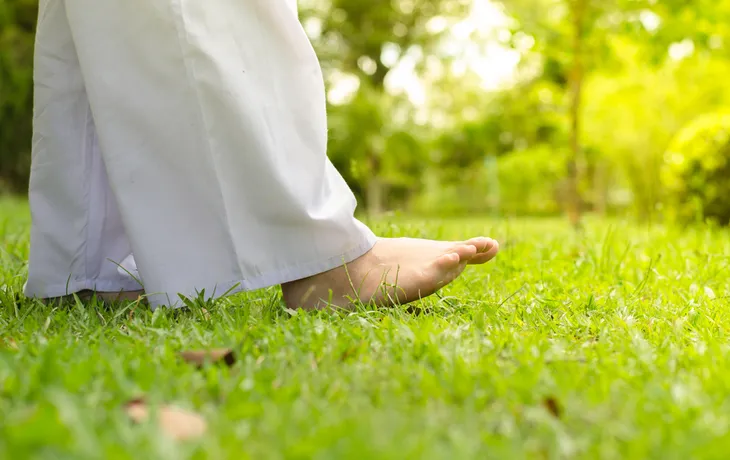When people think of staying in shape, they often think about high-impact cardio, weight lifting, or intense sports. However, you don’t need to exert yourself too much to get the benefits of regular exercise.
Whether you’re taking the dog for a walk, or you’re going for a walk with your camera to capture some fall colors, walking can have many benefits without the risk of injury that some other forms of physical activity have. Here are seven reasons to walk your way to a healthier future…
Lowers Risk of Cardiovascular Disease
StepToHealth.com says, “Plenty of people aren’t aware of the many health benefits of walking.” That being said, it also explains that about 40-percent of adults don’t walk “at all,” and that number is increasing as technology keeps more people inside.
However, it says walking 30-minutes per day can have huge health benefits, namely cutting your chance of developing cardiovascular diseases – this half hour of daily walking can cut heart disease and stroke by 27-percent, it adds. “By increasing your heart rate, daily walks greatly improve your overall heart health,” notes the source.
Helps Ward Off Other Diseases
The Michigan State University notes that walking can help prevent chronic diseases other than heart disease, including type 2 diabetes, and even some forms of cancer. In the case of diabetes, simple walking helps lower blood glucose and resistance, notes the source.
Since cancer is the second leading cause of death after heart disease in the U.S., the source explains that getting at least 150-minutes of “moderate-intense” (meaning brisk) activity spread throughout the week can help lower the risk. That’s only about 20-minutes per day when you do the math, which should be manageable for most people.
Controls Anxiety and Boosts Mood
A post from Reader’s Digest suggests seven tips to “get the most happiness from your daily walk,” adding that making small changes to your current walking routine can ease anxiety. In fact, just changing the way you walk can have an impact on how you feel, notes the source. (Check out these Exercise Prescriptions for Mental Health).
It cites a study in the Journal of Behavior Therapy and Experimental Psychiatry that says participants remembered more positive words from a list when they employed a “happy” walking style (straight posture and arm swinging) than those with a negative walking style (slumping with little arm movement).
Promotes Weight Loss
You might not equate walking with a weight loss regime, but according to sources including DevelopingGoodHabits.com, “Walking to lose weight is possible.” The source says you can lose 1-pound per week by building “the walking habit.”
It explains that this weight loss doesn’t involve any fad diets or other hidden tricks. Perhaps more surprisingly, the same source claims that walking can often burn more calories than running. Using a 300-pound man as an example, it explains that at a 3-miles per hour walking speed, this subject would burn 540-calories in an hour, and 857-calories at 2-miles per hour during a 2-hour stroll to “smell the roses.”
Easier on Joints
Jogging and other forms of activity can be tough on your joints because you’re putting more pressure to the ground with each step compared to a moderate walk. In fact, the Arthritis Foundation said walking actually “supports your joints,” helping to bring oxygen and nutrients to cartilage that normally doesn’t get fed by inactivity. “If you don’t walk, joints are deprived of life-giving fluid, which can speed deterioration,” it adds.
Not only can it help your joints, walking can also help to tone and strengthen leg and abdominal muscles, and adding a “pumping” arm motion during your walk can increase range of motion and take pressure off joints and muscles – which is especially helpful if you have arthritis, it adds. (Here are more Low Impact Joint-Friendly Forms of Exercise).
Benefits of Fresh Air
Walking on a treadmill in a gym is all fine and dandy, but you’re not surrounded by nature or breathing in fresh air while doing this. YourStandardLife.com explains that staying indoors for long periods of time means you’re breathing recycled air, and the oxygen content will steadily drop.
Getting a steady supply of fresh oxygen has many benefits, including cleansing your lungs, better mental clarity, better digestion, and even increased serotonin that is linked to a positive mood, offers the source. There is one caveat, however: “In big cities, you need to find a park or garden with plenty of trees and plants to enjoy fresh air. Also good quality air can be found in abundance around seashore and beaches,” adds the source.
Creative Juices May Flow
Apparently regular walking will help you be more creative, according to Prevention.com. “Whether you’re feeling stuck at work or you’ve been searching for a solution to a tricky problem, research shows it’s a good idea to get moving,” notes the source.
It cites a 2014 study in the Journal of Experimental Psychology, Learning, Memory, and Cognition that finds walking in particular can spark ideas. The researchers found that subjects that were walking around had more solutions to “creative-thinking tests” than their seated counterparts, it adds.










